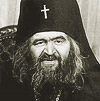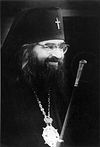

| Previous day | Next day |
| Old Style
September 29
|
Saturday |
New Style
October 12
|
| 17th Week after Pentecost. Tone 7. | No fast.
|
![]() St. Cyriacus the Hermit, of Palestine (556).
St. Cyriacus the Hermit, of Palestine (556).
Martyrs Dada, Gabdelas, and Casdoe, of Persia (4th c.). St. Theophanes the Merciful, of Gaza. St. Cyprian, abbot, of Ustiug (Vologda) (1276). St. Onuphrius the Wonderworker, of Gareji, Georgia (1733). Uncovering of the relics of St. John (Maximovitch), archbishop of Shanghai and San Francisco (1993). Synaxis of the Saints of Poltava.
New Hieromartyr John (Pommer), archbishop of Riga (Latvia) (1934).
Holy Martyr Gudelia of Persia (4th c.). 80 Holy Martyrs of Byzantium (364- 378). St. Ludwin (Leudwinus), bishop of Trier (713). Martyrs Tryphon, Trophimus, and Dorymedon, and 150 Martyrs, in Palestine.
Repose of Blessed Anthony Alexeyevich, fool-for-Christ, of Zadonsk (1851), and Archimandrite Gerasim (Schmaltz) of Alaska (1969).
Thoughts for Each Day of the Year
According to the Daily Church Readings from the Word of God
By St. Theophan the Recluse

Friday. [Phil. 1:27-2:4; Luke 6:17-23]
The Lord blesses the poor, those who hunger and weep, and the persecuted under the condition that it is all for the sake of the Son of Man; this means that He blesses a life which is surrounded by every kind of need and deprivation. According to this saying, pleasures, ease, honour are not something good; this is the way it is indeed. But while a person rests in these things, he does not realize this. Only when he frees himself from their spell does he see that they are not the good, but only phantoms. A soul cannot do without consolations, but they are not of the senses; it cannot do without treasures, but they are not in gold and silver, not in luxurious houses and clothes, not in this external fullness; it cannot get by without honor, but it lies not in human servility. There are other pleasures, there is other ease, other honour—spiritual, akin to the soul. He who finds them does not want the external ones; not only does he not want them, but he scorns and hates them because they block off the spiritual, do not allow one to see it, they keep a soul in darkness, drunkenness, and phantoms. This is why such people prefer with all their soul poverty, sorrow and obscurity, feeling good within them, like behind some safe fence against the spell of the deceptions of the world. What about those people who have all these things without trying? They should relate to all of these things, according to the word of the holy Apostle, as one who possesses not (cf. 1Cor. 7:30).
Saturday. [I Cor. 15:58-16:3; Luke 5:17-26]
But that ye may know that the Son of man hath power on earth to forgive sins, He said to the paralytic, I say unto thee, Arise, and take up they couch, and go into thine house. Remission of sins is an inner, spiritual miracle; healing from paralysis is an outer miracle—the natural acting of God in the world, a physical miracle. The flowing in of God’s power is justified and confirmed by this event in the moral realm, and in the movement of phenomena in the physical world. The latter is in view of the former, for in the former lies the goal of everything. The Lord does not coerce one’s freedom, but gives understanding, inspires, and amazes. One of the best means for this is an outer miracle. This came to be when man became a rational creature, ruled by freedom. This connection is so essential, that those who reject the supernatural action of God in the world also reject the freedom of man, along with the recognition that the latter must necessarily call forth the former. On the other hand, those who confess the truth of God’s influence in the world beyond a natural flow of events can say boldly: we can feel that we are free. The recognition of freedom is as strong and irresistible as the recognition of one’s existence. Freedom urgently demands direct providential actions of God: consequently the acknowledgement of these actions stands as firmly as the recognition of freedom.
Articles
 Opening of the Relics, and Glorification of St. John MaximovitchArchpriest Peter Perekrestov"He is incorrupt! His relics are incorrupt!" |










